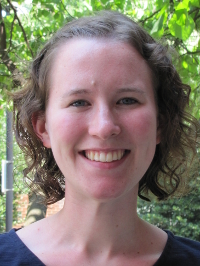2014 SRE Program Participant Profile: Kelly Moran

|
Hometown: Wasilla, AK |
Why did you apply to the SRE program?
I applied to this particular SRE program because I wanted to gain research experience and I am particularly drawn to areas in which mathematics is applied to thought-provoking questions in other fields. All of the NIMBioS projects seemed very engaging, but the one that I am working on stood out to me as something that I had never been exposed to before but that would be very interesting to learn about.
How did you hear about the program?
I heard about the program through an online search for SRE programs combining math and biology.
What is the purpose of your research?
The purpose of my research is to understand the relationship between a person's experiential response to emotional stimuli (meaning what they feel) and their behavioral response (meaning what their facial expression is) when the stimuli in question is ambiguous in nature. We are studying how closely these two response systems match up and trying to come up with a model that explains when they fail to align.
![]()
My favorite part of the program so far has been the feeling that I am truly a collaborator on the project.
![]()
– Kelly Moran, SRE participant
What does the research ultimately accomplish? What contributions to science and/or humanity does the research ultimately make?
Understanding human emotion allows us to more fully fathom the human experience. Furthermore this research could potentially be used to contribute to the awareness of how psychological disorders may impact emotional response.
Describe a typical day on the job.
My typical day is spent reading scholarly articles and coding in Matlab. I spend a lot of time brainstorming ideas for how to analyze and understand my data and then coding the idea to see if it works. Also I spend a lot of time collaborating with my team, even if that simply means working in the same room to offer moral support.
Tell us something about your field of study we would be surprised to know.
Psychology is much more statistics-heavy than I realized prior to this research! Also researchers have to deal with incredibly messy and imperfect data, and there are no concrete answers.
Do you have an interesting "personal side" to your research experiences that will increase human interest in your story?
I don't really have a "personal side" to my research experience other than being driven by curiosity.
What were your favorite parts of the SRE program?
My favorite part of the program so far has been the feeling that I am truly a collaborator on the project. The mentors offer guidance and support, but they also treat me like a peer who can offer valuable input to the process. I also love the rush that you get when you, say, finally code something successfully and see the graph appear on your screen, or when you have a brilliant idea about how to frame your problem.
What new experiences did you gain that have helped you today?
I have gained confidence and self-sufficiency. This program has helped me to realize that rather than asking a professor how to do something I can brainstorm and talk to my peers and work on the problem myself and eventually that can lead me to a path. Granted, it may be a more winding and thorny path than the paved road a professor could send me down, but it could lead to just as many interesting places.
What advice would you give someone who's interested in/curious about participating in the program?
I would say that if you are curious about this program you should think about what you want to get out of your summer. If you are looking to learn more about research, receive mountains of support and opportunities, and be around interesting and diverse people, then it doesn't hurt to apply. When considering which project to list as your top choice, try to picture how it would feel working on each project for the next 8 weeks. If the thought sounds boring to you, don't choose that project. Pick one that you could really sink your teeth into.
Would you recommend our program to others?
Yes!! I have been very happy with my decision to come here. I think that this program offers many opportunities for challenge and growth, and that the mentors and advisors are all phenomenal sources of guidance.
What do you do outside of work (hobbies, sports, associations, activities)?
Outside of work I enjoy being active: playing Ultimate frisbee and racquetball, downhill and cross-country skiing, hiking, and pretty much anything outdoors. I also enjoy the arts. I play the oboe in several ensembles and am the president of my university's orchestra association. Recently I have gotten into Lindy Hop, which is the grandfather of all varieties of swing dance.
Where do you see yourself in 10 years?
My main question coming into this program was whether I could see myself going to graduate school down the road, and participating in this SRE has helped me to see that the answer to that question is a resounding ‘yes'! In 10 years I hope to have completed a Ph.D., possibly in economics or statistics, such that I can work in a field that allows me to combine mathematics and the social sciences. After my studies I hope to be working at a university or research group quantifying and addressing the public policy problems of import to this generation. Prior to completing my Ph.D., I hope to live overseas in Southeast Asia for several years and become fluent in a non-romance language.
NIMBioS
1122 Volunteer Blvd., Suite 106
University of Tennessee
Knoxville,
TN 37996-3410
PH: (865) 974-9334
FAX: (865) 974-9461
Contact NIMBioS


